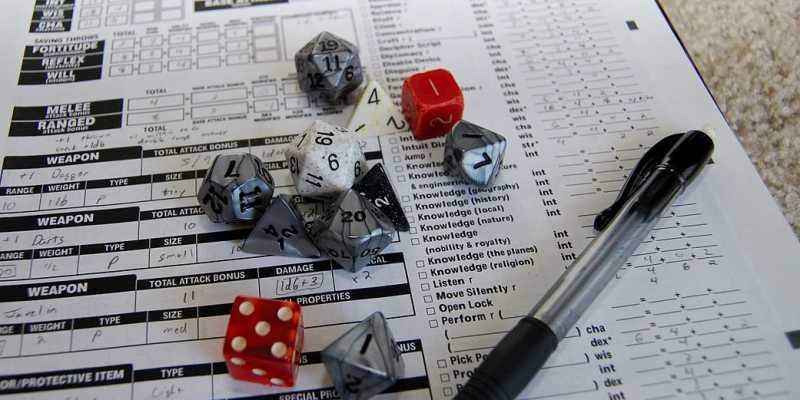Here is a list of a few common things to know before you start playing role playing games. Most people are probably concerned about jumping in with both feet but if you can remember these basic rules, you will be ready to start enjoying years of adventures with your best friends and family.
These were written by my son, Coby Totland, for his school sci-fi club where they sometimes play D&D games.
Some Common Misconceptions
They are Satanic
Dungeons and Dragons and Call of Cthulhu seem to have a common misconception of people believing that it promotes satanism, murder, suicide, and witchcraft. This misconception is not as common today, but it is still believed by some. It started in the early 1980’s, when there were multiple killings involving the assailants being people who play Tabletop RPGs (Role Playing Games) which caused nervous parents to ban the game from their kids. Another stem of this lie is how some people would run their games. It is true, that some Game masters run their game with links to satanism, rituals, and killing innocent people. That is not how most game masters run their game though, it is usually run for the purpose of good triumphing over evil, instead of the opposite.
It is Complicated
D&D, Call of Cthulhu, Edge of the Empire, and etc. all involve basic levels of math. But a common misconception is that it is complicated, and hard to follow. This is not true, these games are not too complicated for most people, and just take some time to learn. There are also multiple editions for each game, some of which are considered simpler and easier to follow. There are home brews, which are games that are created and edited by the Game master, which the complexity is completely dependent on the Game master. To state that all of these games are complicated is incorrect.
Tips for Playing a Better Game
Do Not Argue with the Game Master
The game master has personally taken the time to create a one shot or campaign for everyone’s enjoyment. It is their game, and it is commonly considered rude and disruptive to argue with him or her. If there is really a problem you are keen on fixing, talk to the Game master after the session, and politely compromise to a solution. But one thing to remember, is that the Game master gets the final say in everything, it is their game.
Be Respectful
Tabletop RPGs require teamwork and cooperation. You should not interrupt another player, and you should not try to force an idea or plan onto your teammates if they do not want to proceed with it.
Try not to argue with your teammates, it just wastes time and will not lead to anything beneficial usually. Instead, try to come up with a compromise that will benefit the entire party.
Pay attention to what is going on throughout the game. You should be listening to the GM’s story and details. You should also be listening and cooperating with your teammates, by listening to each other’s plans and ideas. Catching tiny details is very important in tabletop RPG games, and can turn a negative situation into an opportunity for greatness, so pay attention.
Do not get upset if you die due to an accident from a teammate. It may be aggravating, but you must understand that in the end, it is just a game for everyone’s enjoyment. You can always talk to the GM and set up a new character sheet after the session. Arguing with a teammate because they made a mistake does not help the situation, and will just make it worse.
Try Not to Play an Evil Character
Try not to play an evil character. Playing an evil character is usually not fun for the entire group because it will always end in a players death. Having a teammate try to kill you is not fun, and does not help the party in any way.
It ruins the overall idea of teamwork and cooperation, and ends with a lot of arguing and annoyed players. If you get the personal acceptance from the GM, allowing you to player an evil character, then go ahead.
But remember, that the game is for everyone’s benefit, not just your own.
Teamwork
Teamwork is by far one of the most important things in most Tabletop RPGs. A party must work together in order to complete most missions and quests, therefore having good teamwork is beneficial, and speeds up the process.
To have good teamwork, you must be willing to help your fellow teammates, even if it requires you possibly dying.
For example, if your teammate is about to die, you can use your action to jump in front of him and soak some damage. This will allow your teammate to retreat and recover, while you lose some health.
Another example is pooling your money together. If a teammate needs to buy some more arrows, ammunition, or potions, but does not have enough money, you can help purchase it.
Coming up with battle strategies before entering combat, or purchasing healing potions for your teammates can go a long way as well. In the end, most tabletop RPGs are revolved around teamwork, and I recommend all players learn to keep this in mind.
Conclusion
Remember, tabletop Role Playing Games (RPG) are fun for everyone. It’s never about winning but how well you play the game. Remember the journey and adventure and enjoy your time with your friends and family.

